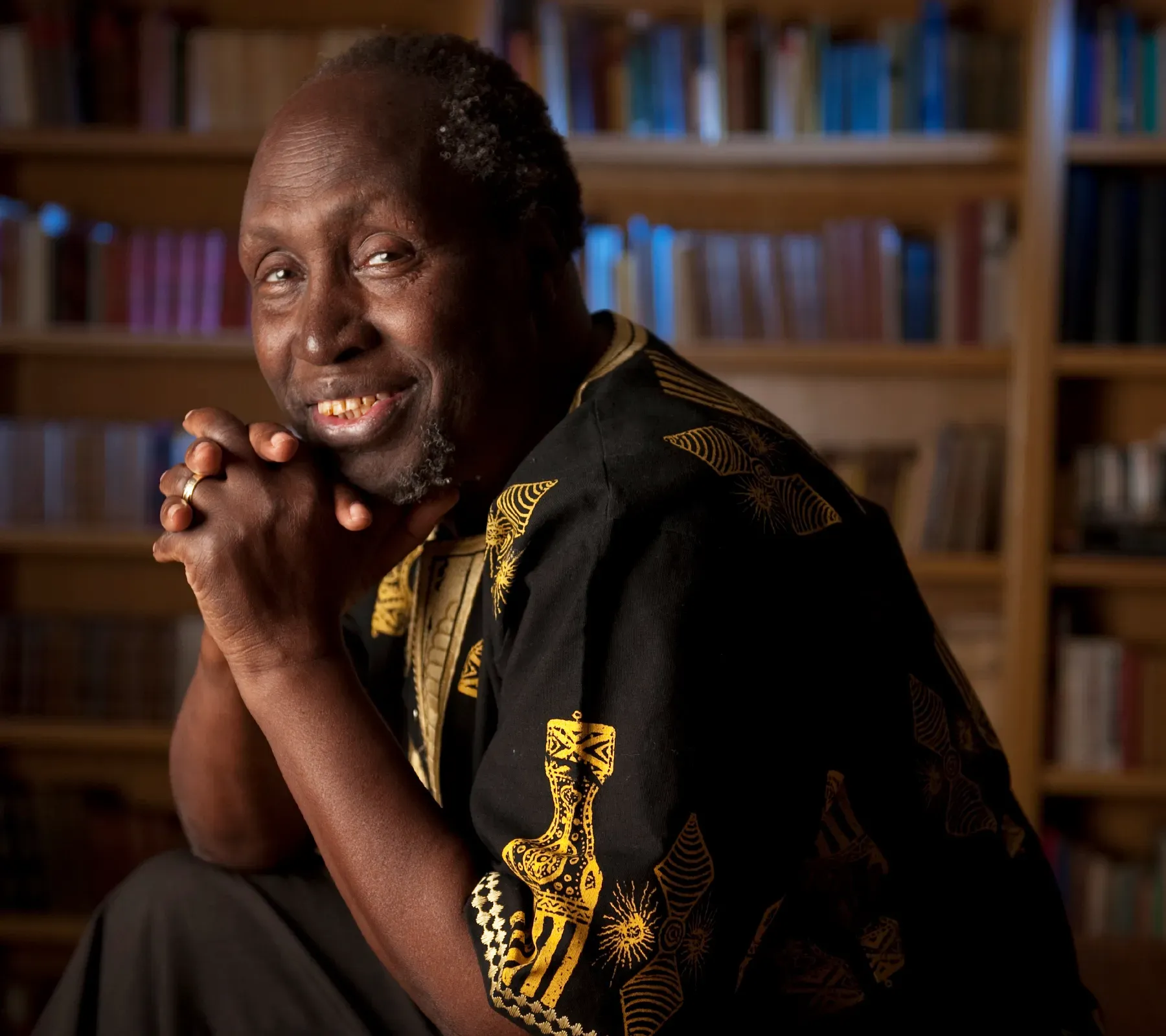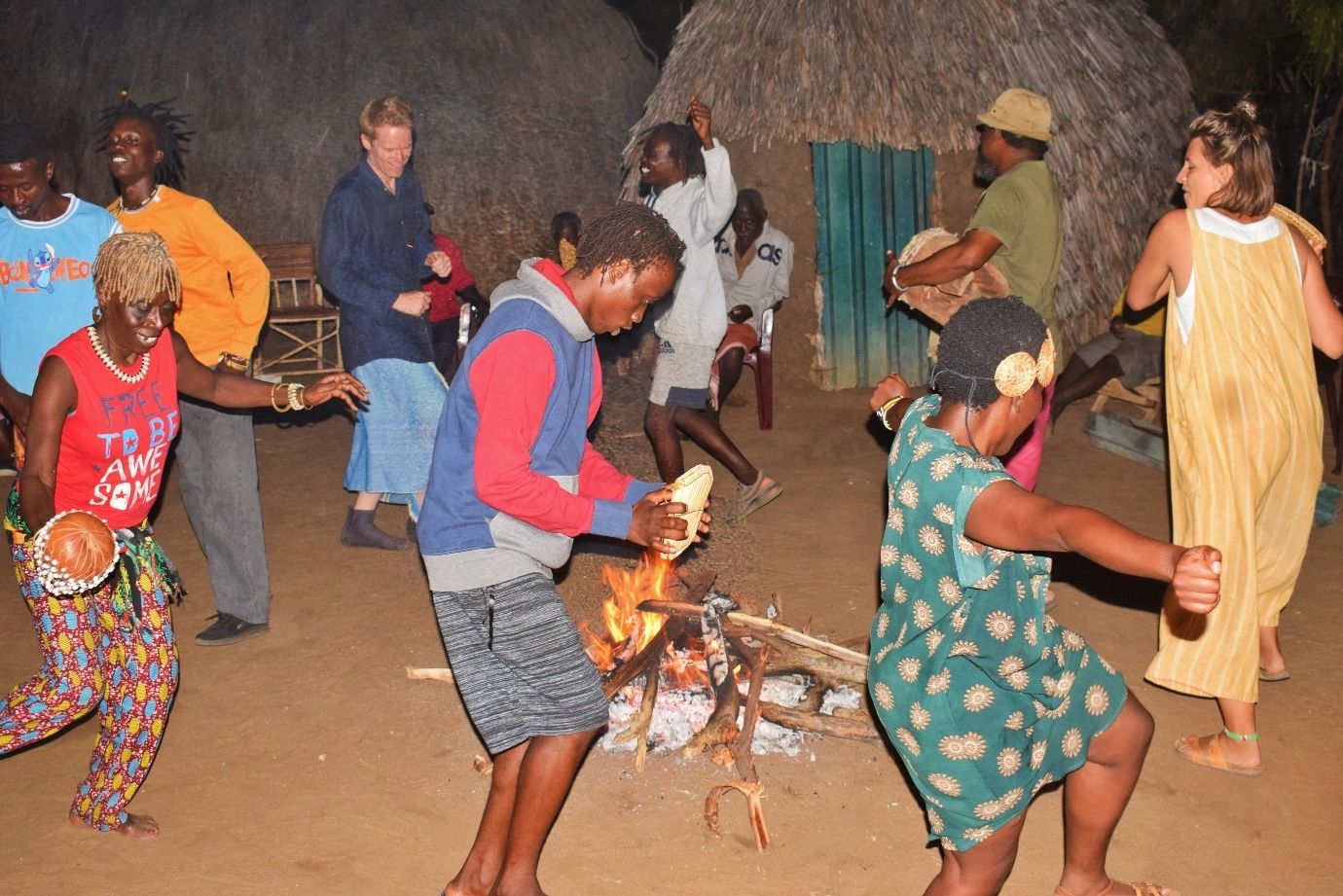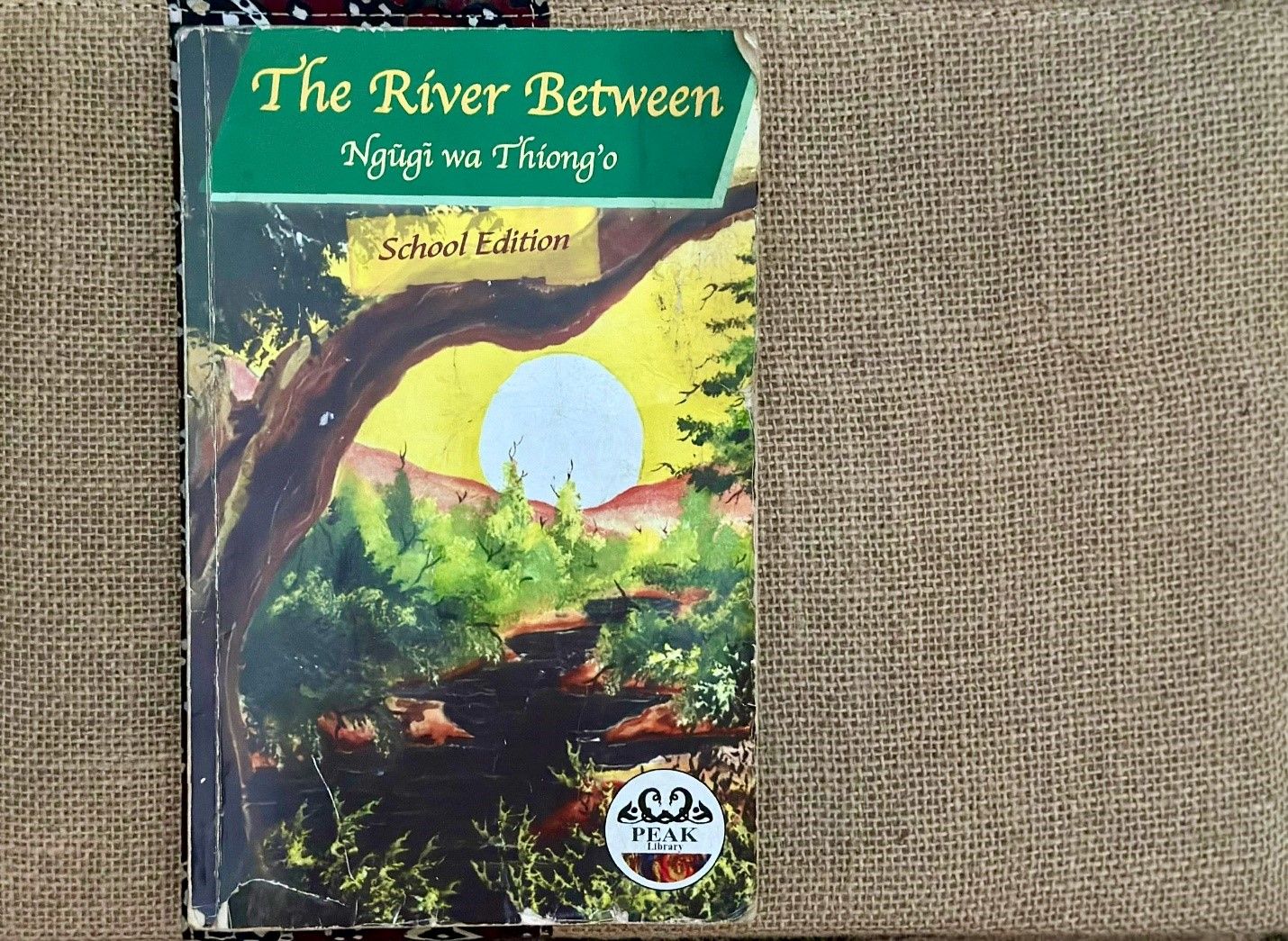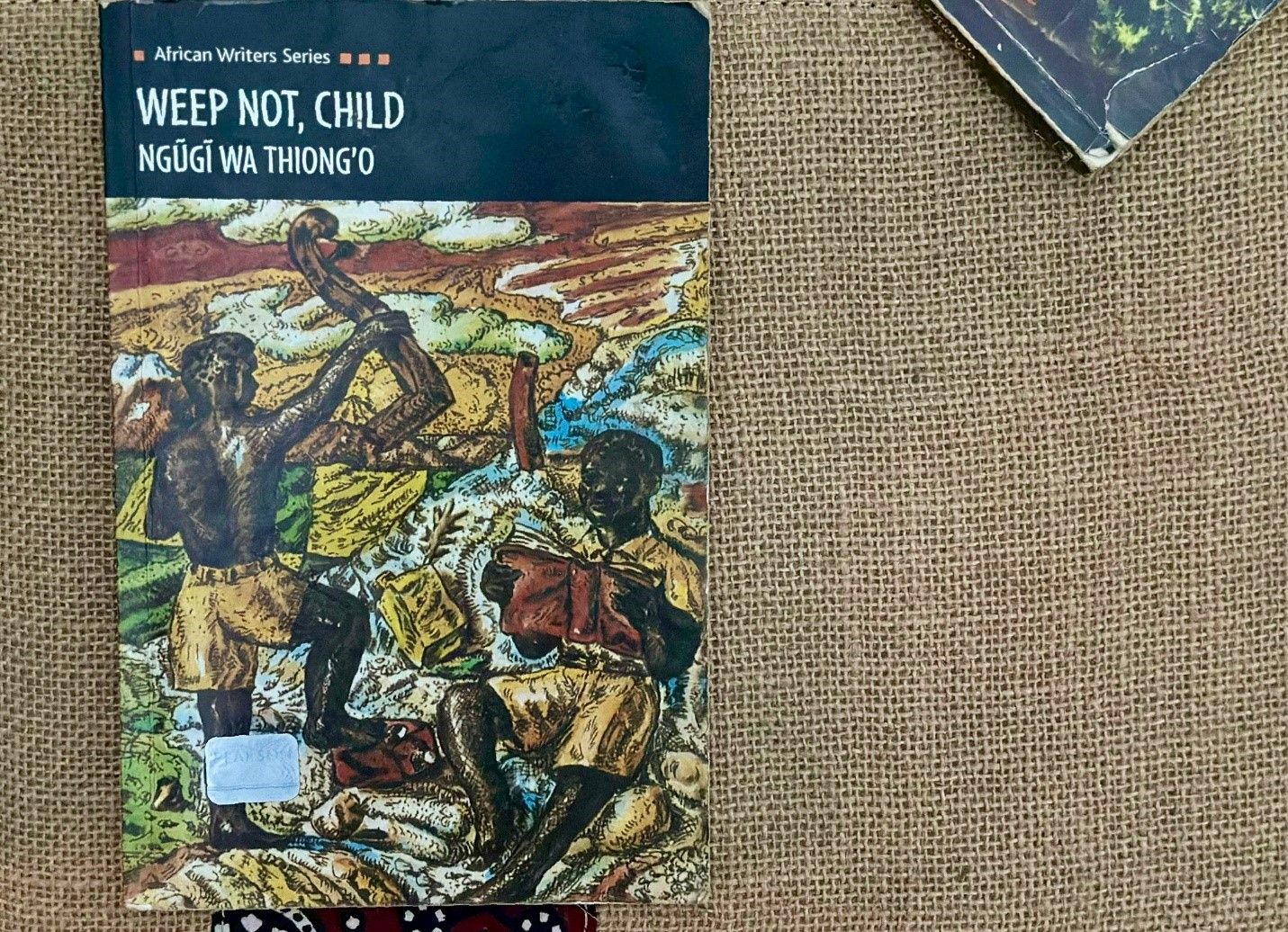Trigger Warning and Disclaimer: the content that you are about to read contains graphic and sensitive experiences. Reader discretion is advised. Read our full editorial notice here.
This 2025, upon May’s end (28th), news comes. The author of my favorite book has passed on to eternity.
Our Story Begins
I met Ngugi wa Thiong’o as a young teenager. At the time, I was mesmerized by his tale of Nyambura and Waiyaki as leading characters in his book The River Between, whilst also getting an initiation into the literary soul of Africa.

The late Ngũgĩ wa Thiong’o, African writer. Source: New African magazine
Early 2000’s, between the frenzy with Facebook and the cold of boarding school, I found a place to go. A moment to travel out of the district where I schooled and the landlocked borders of, not just the missionary founded school gates, but of post-colonial Uganda. In Ngugi’s tales, I saw a glimpse of the African history at my Ugandan neighbors of Kenya.
In The River Between, I met the ridges. The two sleeping giants of space separated by a river at the shores (imagine it like the East African Nalubale or Nile). By the river, two characters were falling in an impossible love.
Muthoni, Nyambura’s sister who suffers death in The River Between, had been my best bet as I read about tribal initiation. I too hoped to stick with the African call to dance. In Waiyaki’s father Chege, I heard the fore comers nudge to learn the ways of the new age but not be subdued. Afterall, the Banyankole who I knew in Uganda cautioned too that “akana katagyenda kati mama atekagye!” (The child who doesn’t move will only regard the mother’s cooking).

Writer (green dress) enjoys a Mwanzele dance hosted by Malindi District Cultural Association, Kenya. Credit: Martin Kaona
This mid-2025, I am reminded of this education in art. In an interview reel , one of many circulating social media, Ngūgī cautions us to find empowerment in adding to the mother tongue a foreign language, and resisting the enslavement that comes in discarding a mother tongue. The irony here, albeit Ngugi’s advocacy for the African languages, access to his work came my way by means of studying literature in English (just as I now bid him farewell in this same foreign language).
The call for choices
By the pages 111 of The River Between, the character Nyambura finds that the “river no longer soothed her”. While the storytelling highlights a fictional Nyambura, the name ‘Nyambura’ is a central name in the author’s real-life.
Ngūgī’ as now survived by family, is, just like Waiyaki at his second birth, called to memory with a domestic devil to take the cross. In this posthumous regard, Ngūgī wa Thiong’o leaves memory of an unsavory relationship towards his first wife Nyambura, Kenyan woman, teacher, farmer and the mother of some of his children whom he knew from early life before pursuing education at Makerere University.
In the book, Nyambura says no to Waiyaki. While divergent storylines, the fictional Nyambura of the book serves literary notification that the real Nyambura who says yes to the author bears critical sense to the Ngūgī story. To regard the author with literary heroism or martyrdom the question to ponder is, does the literary survive in a vacuum? And when the literary is threatened with political persecution, does the human holding the literary receive refugee or disperse this persecution?
In this article, as I bid goodbye to the literary, I care to oblige the human. Hero or Martyr, June asks us Ugandans. Yet in dissecting these instances, the third aspect rolls: human. Who is the human that socially regards hero or Martyr posthumous? Ngūgī who I recognize as a literary hero, is not Martyr to all injustices and oppression. Still, while an artistic Martyr for the Kenyan story, the author isn’t a hero in the full domestic family frame. This obituary asks of Ngūgī, is it that the choices of a land, a nation, a people, a humanity, these choices corrugate injustices as they postulate correctness?
Indeed, as the literary survives, what sensibilities carry me as a curious reader and woman today; when history doesn’t soothe me like the character Nyambura at the river.

Ngugi's book The River Between from 1959 and my first fictional read.
My favorite literary snack
Late 2010’s I met Ngūgī again when tasked to study his book “Devil of The Cross”. Ngūgī begins this tale in full tale mode. The seer is troubled! This is the quandary that opened the magic spell of the book. To peel at questions that transcended time for the African of the past, present and the future.
Is the devil finally on the cross?
This 2025, Ngugi leaves history in a time of a few questions.
Ngugi’s passing is only a few months since Donald Trump took new office in the United States of America. USA is important here because at Ngugi’s time of passing, he is professorially connected to the USA. The current social politics in USA about Diversity, Equality and Inclusion (DEI) programs maybe one to send a chilly breeze. In this politics, the African is required to discard the reasoning in their history and identity. This threatens to ripple into more blank gaps for the African story. The possible theft of identity however isn’t a shocking projection but a chilling dawn as Ngūgī rests on.
Today, I wonder whether the devil is on the cross globally.
To procure this analogy, I must bring you to the cave party in Illmorog, better put by Ngūgī as Devil’s Feast, where business men from all around the world gather to compete. In the book Devil on the Cross, the main character, Wangari, has a vision like most haven’t seen. She has seen the wanders of a Nairobi cold breeze! But the character has a mission_ she must put the devil on a due cross!
The character attends a gathering of international businessmen; some of whom have bellies sagging with all the corruption stolen and really, some of whom have their faces bulged with all the air robbed. It is a den of thieves. That is how Ngūgī captures the capitalist in the book.
The author Ngūgī wa Thiong’o, Kenyan native, passes on soon after Kenyans arise in a contemporary sense reverent of the Mau-Mau historical sense. The Mandamano spirit exhumed against Kenya’s Ruto, calls one to wonder again whether the devil is on the cross? Following a proposed Finance bill, not unlike the Trump tax-bill in USA this 2025, the Kenyan Mandamano continues, like the Mau-Mau against colonialism, to implore account for a dignified continuity in one’s homeland.
As Ngūgī warns in the book Devil on the Cross, air has become a commodity that is to be packaged, housing is at overpriced nests, and a person’s oxygen is soon to be measured per unit. Here, the business men compete to squeeze more tax on even God’s very nature!

Ngugi's Weep Not Child from and his first fictional book.
Linking the threads of time
Today, as Ngūgī departs, its plausible that his literature may not be taught in the country where he has spent time teaching. In today’s USA the devil to contend the cross surfaces in education around African descent’s history and what it means when that history is discarded? Does Ngūgī posthumously reckon much of African studies will be explored on that side of the world?
And here in Africa, will the literature continue to reecho the sounds of resistance through time.
This moment of transformation in consciousness is one that shouldn’t be ignored. With much of African history documented in English and the foreign perspective, it stands to reason that should that education be dispelled or treated to the current political dialogic (and dis-logic), then the science of information on Africa may suffer along. Nonetheless, even when context discarded to time may fall from consciousness, art sustains the safe bet to travel through time.
Now, whether Ruto or Trump bother with literary discourse, isn’t the concern for this article. My interest is to acknowledge Ngūgī wa Thiong’o. His literature is an opportunity for the artistic narrative to survive the composer. Ngūgī’s works go on across time as a reminder to harvest wisdom in the knowledge formed in the art from the past, present and future. For now, Goodbye Ngūgī! (See you in the yellow pages*).
—
The yellow pages*Ngūgī wa Thiõng’o: Weep not child, 1999. The River Between, 1959. Devil on the Cross, Matigari, Ngaahika Ndeenda, Decolonizing the Mind.
